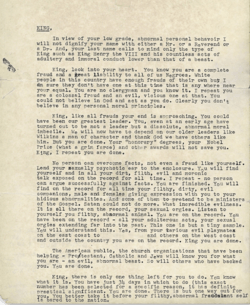FBI–King suicide letter

The FBI–King suicide letter or blackmail package was an anonymous 1964 letter and package by the Federal Bureau of Investigation (FBI) meant to blackmail Martin Luther King Jr.[1] The phrase "You Are Done" is a noted warning from the letter.[1]
History
On November 21, 1964, a package that contained the letter and a tape recording allegedly of King's sexual indiscretions was delivered to Coretta Scott King, and later to Martin Luther King Jr. Although the letter was anonymously written, Martin Luther King Jr. correctly suspected the FBI sent the package.[2][1] Coretta Scott King described the tapes by saying "I couldn't make much out of it, it was just a lot of mumbo jumbo."[3] The letter does not specify precisely what action it is urging King to undertake; King understood the letter as advocating that he commit suicide,[1] although some have suggested that it was merely urging him to decline the Nobel prize[4] or step out of leadership.[1]
On March 8, 1971, an activist group called the Citizens' Commission to Investigate the FBI burglarized a local office of the FBI in Media, Pennsylvania and stole classified documents. Part of those documents revealed a secret FBI operation called COINTELPRO. Those documents were later sent to newspapers and members of the United States Congress. During the Church Committee hearings and investigations in 1975, a copy of the "suicide letter" was discovered in the work files of William C. Sullivan, deputy FBI director.[5] He has been suggested as its author.[6][1] Once the surveillance tapes of King were publicly revealed, Bernard Lee and the Southern Christian Leadership Conference (SCLC) sought to have tapes gained by wiretaps destroyed in a lawsuit.[7] Their request was denied by United States District Court for the District of Columbia judge John Lewis Smith Jr.[7] He ordered all tapes sealed until the year 2027 and placed into the National Archives and Records Administration.[7]
Since 1977, attempts have been made to release the recordings in the United States Congress. Republican Senator Jesse Helms from North Carolina in 1983 sought to reveal information about King in order to undermine the establishment of the Martin Luther King Jr. Day.[8] The Martin Luther King Jr. Records Collection bill has been introduced in Congress by Democratic Representative Cynthia McKinney from Georgia in 2002 and 2005, by Democratic Senator John Kerry from Massachusetts in 2006, and by Democratic Representative John Lewis from Georgia in 2010, but the bill was never passed by Congress.
A copy of the letter is known to exist in J. Edgar Hoover's confidential files at the National Archives.[1]
See also
Notes
References
- 1 2 3 4 5 6 7 8 Gage, Beverly (November 11, 2014). "What an Uncensored Letter to M.L.K. Reveals". The New York Times Magazine. Retrieved June 25, 2017.
- ↑ Powers 2004, p. 246.
- ↑ Dyson, p. 217.
- ↑ Powers 2004, pp. 246f.
- ↑ Powers 2004, p. 290.
- ↑ Powers 2004, p. 245.
- 1 2 3 "Judge Orders Seal on King Wiretaps". Deseret News. United Press International (UPI). February 1, 1977.
- ↑ Romero, Frances (January 18, 2010). "A Brief History Of: Martin Luther King Jr. Day". Time. Retrieved April 15, 2016.
Bibliography
- Dyson, Michael Eric (2000). I May Not Get There with You: The True Martin Luther King, Jr. Simon and Schuster, 2000. ISBN 9780684867762.
- Powers, Richard Gid (2004). Broken: The Troubled Past and Uncertain Future of the FBI. Simon & Schuster. ISBN 9780684833712.
Further reading
| Wikisource has original text related to this article: |
- Abernathy, Ralph David (2010). And the Walls Came Tumbling Down: An Autobiography. Lawrence Hill Books. ISBN 9781569762790.
- Gage, Beverly. G-Man: J. Edgar Hoover and the American Century. Simon & Schuster Ltd. ISBN 9780857201058.
- Garrow, David J. (2015). The FBI and Martin Luther King, Jr.: From "Solo" to Memphis. Open Road Media. ISBN 9781504011532.
- Garrow, David J. (2015). Bearing the Cross: Martin Luther King, Jr., and the Southern Christian Leadership Conference. Open Road Media. ISBN 9781504011525.
- Gentry, Curt (2001). J. Edgar Hoover: The Man and the Secrets. W. W. Norton & Company. ISBN 9780393343502.
- Kotz, Nick (2006). Judgment Days: Lyndon Baines Johnson, Martin Luther King, Jr., and the Laws that Changed America. Houghton Mifflin Harcourt. ISBN 9780618641833.
- Maxwell, William J. (2015). F.B. Eyes: How J. Edgar Hoover's Ghostreaders Framed African American Literature. Princeton University Press. ISBN 9781400852062.
- Medsger, Betty (2014). The Burglary: The Discovery of J. Edgar Hoover's Secret FBI. Knopf Doubleday Publishing Group. ISBN 9780307962966.